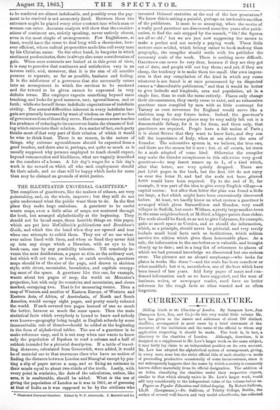CAN A GOVERNESS BE HAPPY?* THE authoress of Margaret Stourton
(for it is not unfair to assume that a writer who systematically prints in italics the least important words of the least important sentences is a lady) has written the feeblest of tales to enforce the important truth, if truth it be, that there is no reason why a governess should be less happy than any other person. Since her opinion on this point may be said to have some slight amount of originality, or at least of novelty, whilst the same compliment cannot be paid to any other sentiment expressed or character drawn in the course of two hundred and odd wearisome pages, it is best to reverse the ordinary course of proceeding, and instead of dwelling on the tale, and missing the moral, to dismiss the story, and devote our attention to the lesson. The biographer of Margaret Stourton obviously argues as follows :—Margaret Stourton was a governess, Margaret Stourton was happy, there- fore, all unhappy governesses (of whom, by the way, one Miss Edge stands as the representative), lack Miss Stourton's virtues or graces. It is, of course, the inherent defect of all inferences drawn from the example of fictitious personages, that authors
* Margaret Stourton; or, a Year of Governer; Life. London: Rivingcon, waterloo place. 150.
who can arrange the circumstances of their heroes existence can make any position in life full of enjoyment, and if a novel is to teach anything whatever, it is essential that its composer should place his characters in the situation they would ordinarily occupy in real life. The trade of a shoeblack is not commonly considered a very enviable employment ; but a writer who should place his hero in that position and represent him as constantly receiving guineas from benevolent old gentlemen might easily prove that no pursuit was so sure a road to fortune and pleasure as the diligent blacking of boots.
Margaret Stourton might well have been happy, and so might the most querulous of ladies in her place. She leaves a home where she is petted and flattered to go to a house where she is, if that be possible, petted and flattered still more. Her employer is away, her pupils are pleasant. An old nurse is always ready to smooth every difficulty, light labours are repaid with a large salary, and, whatever might be the sufferings of a year of easy employment, they are rewarded by a marriage with a lover endowed with every Christian grace, and with a large fortune into the bargain.
Though regard for strict accuracy compels us to add that Master Oliver caused his teacher some pain by a downright lie, and that the suitor was, perhaps, a little slow in making his proposals, still, a candid judge will, when all drawbacks are taken into account, not hesitate in deciding that if the aim of life be "to secure the lot of pleasures," Margaret came very near to attaining the end of human existence. If she was not happy it is difficult to say where happiness can be found, and if many governesses share her good fortune they are assuredly a class to be' envied rather than pitied. Unhappily the contented optimism of such writers as the author of Margaret Stourton overshoots the mark, and of itself suggests that there is a dark side to the picture painted in such brilliant colours. As a general rule no one thinks it worth while to show that any class ought to be comfort- able till it becomes pretty clear that they are uncomfortable.
No one writes little books to prove that barristers, or shoe- makers, or housemaids ought to pass a not unenviable life, for everybody assumes that their chances of happiness are equal to the chances of their fellow-creatures. Books like Margaret Stourton would never be printed were there not numerous tales written to enforce a very different moral, and it is not unreasonable to infer that if Miss Edge overstates her case, when she concludes that "every governess except Miss Stourton is a martyr," the experience of most ladies engaged in teaching would lead them to look with at least as much sympathy on the complaints of Mist Edge as on the exuberant satisfaction of Miss Stourton.
It may, indeed, we suspect, be safely assumed that, in spite of Miss Stourton's experience, the life of a governess is not, as a general rule, either a very desirable or very happy life; but it is a curious question, and well worth consideration—what are the true causes of its unhappiness ? The profession of teaching, though to many persons unattractive, has for others a peculiar fascination, and neither tutors nor schoolmasters are generally supposed to be burdened with any special load of suffering; and it, therefore, cannot be supposed that the miseries of a governess's position arise from the irksomeness of the special employment in which she is engaged. As long, indeed, as her grievances, real or imaginary, are looked at as something totally different from the troubles of other classes, it will be found impossible either to describe their real nature or to suggest their true cure ; whilst a general survey of the different contracts entered into by em- ployers and employed throws light on the causes which produce discomfort in relations between ladies who teach and ladies who pay them for teaching.
As a general rule no relation remains long in a healthy condition in which there is a large mixture of bargain with sentiment. It is, however, unfortunately impossible, in many cases, to avoid this combination, and it would produce a curious and instructive work were any one to form a list of contracts with reference to the degree in which con- siderations of feeling and considerations of business enter into each of them. What in this point of view may be termed simple or definite contracts, such as the bargain that your shoemaker shall make you a pair of shoes, ought to be placed at one end of the list, whilst at the other, as an example of the most complex or indefinite species of con- tract should stand that between a rich old lady and her poor companion. It will be found that in the bargain between the shoemaker and the wearer of shoes few considerations of sentiment are allowed to intervene ; a definite amount of work is paid for with a definite price. The tie between the lady and her companion is at once indefinite and sentimental. The services to be rendered are almost indefinable, and possibly even the pay- ment to be received is not accurately fixed. Between these two extremes might be placed every other contract into which man or woman can enter. Accurate analysis will show that the consider- ations of sentiment are, strictly speaking, never entirely absent, even in the most simple of arrangements. Few Englishmen, at least, would have the sense to deal long with a shoemaker, how- ever efficient, whose radical propensities made him call every man by his Christian name. On the other hand, in bargains in which sentiment predominates, there is always also some consideration of gain. When once contracts are looked at in this point of view, it is easy to perceive that sentiment and satisfaction vary in an inverse ratio, and, moreover, that it is the aim of all sensible persons to separate, as far as possible, business and feeling. It is the misfortune of a governess that she necessarily enters into an arrangement in which the services to be rendered and the reward to be given cannot be expressed in very definite terms. Her employer expects something beyond mere teaching, and looks for good manners, tact, agreeableness, and so forth; while she herself forms indefinite expectations of indefinite civility. The natural difficulties inherent in every indefinite bar- gain are generally increased by want of wisdom on the part no less of governesses than of those they serve. Hard common sense teaches the prudence of reducingto its narrowest limits the element of feel- ing which enters into their relation. As a matter of fact, each party thinks most of that very part of their relation of which it would be wise to think least. There is no reason, in the nature of things, why extreme agreeableness should be expected from a good teacher, and there also is, perhaps, not quite so much as is usually supposed why persons employed to teach should expect, beyond remuneration and kindliness, what are vaguely described as the comforts of a home. A fair day's wages for a fair day's work is the reward on which all who seek employment should fix their minds, and no class will be happy which looks for more than may be claimed on grounds of strict justice.































 Previous page
Previous page